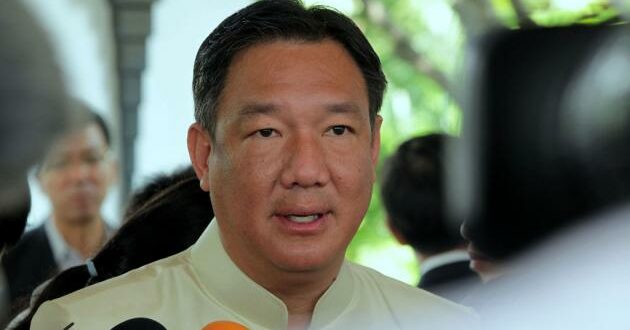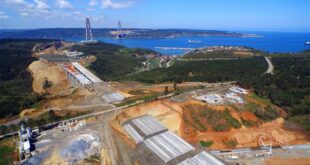Thailand’s new finance minister, Kittiratt Na-Ranong, talks about Greece, the Thai economy and regional cooperation.
As Greece goes hat-in-hand for its second EU and IMF bailout in as many years, Thailand’s new finance minister, Kittiratt Na-Ranong, who is also deputy prime minister, offered a bit of friendly advice yesterday: ditch the euro — you’ll struggle now, but in the long run it will be worth it.
Greek politicians may reach a different conclusion, but they should consider the Thai finance minister’s advice. Thailand pegged its currency at Bt25 to the dollar from 1984 until July 2, 1997, when the country was clobbered by the Asian financial crisis. That’s when the government bit the bullet and floated the baht. Sure, it halved in value, with the cost of a dollar peaking at Bt56 in January 1998. But it has since strengthened to about Bt30 per dollar. The nation has rebuilt.
Now, Kittiratt forecasts that the Thai economy could grow at 7% in 2012 — thanks to post-flood reconstruction efforts by both the government and private sector, and increased wages, which should spur domestic consumption.
“Seven percent growth could be possible if we manage it right without overheating,” said Kittiratt. “And by manage it right I mean by not pushing.”
The official government target for GDP growth is 4.5% to 5.5% — last year, in part due to the disruption caused by the floods that started in July, the economy grew by just 1% to 1.5%, according to Kittiratt.
Kittiratt, who was in Hong Kong for an investment conference hosted by Deutsche Bank and Tisco Securities, was polished in his sales pitch — not surprising given his background: during his career he has been a chief investment officer, chairman of an asset management firm, chairman of a brokerage and, before joining the government as deputy prime minister in August last year, he was president of the Stock Exchange of Thailand. After just six months in politics, he was given the finance ministry to run.
He’s confident when it comes to the fundamental strength of the economy, yet realistic about some of the challenges he faces. For example, 7% growth is clearly an ambitious target — since the 2006 coup, Thailand has been derailed by one event after another, be it political turmoil, terrorism or the more recent floods. But he was more cautious on subjects such as the minimum wage. He acknowledged that salary increases won’t be easy for employers who will have to become more efficient to maintain competitiveness. Some will go out of business. (But he also noted that unemployment, at 0.8% as of November, is not a problem in Thailand.)
He also recognised that as the government spends more — on reconstruction and to pay increased wages to civil servants, for example — it also has to cut back on some of the subsidies it offers to people, such as selling cooking gas at roughly half the price of neighbouring countries, and providing almost free transport to locals. Raising the price of everyday essentials such as these is a hard sell in a country where the rural poor form a voting majority. Indeed, it could be political suicide if not managed right.
Which is why Yingluck Shinawatra, the prime minister, has to deliver on her campaign promises. One of them was to increase minimum wages — and Kittiratt says this is on track. The government increased the minimum monthly wage of civil servants to Bt15,000 (about $500) from Bt10,000 as of January 1, which is costing Thailand roughly Bt20 billion a year.
Kittiratt said yesterday that he thought roughly 30% of the private sector had already increased wages. “I want to hold their hands and convince them that the earlier you start this, the better it is for the company because the employees are more motivated,” Kittiratt said.
In October, Bangkok and six relatively well-off provinces decided to increase minimum wages by about 40%, to a minimum daily wage of Bt300 ($9.70) as of April 1. The rest of Thailand’s 77 provinces will also increase wages by 40%, but off lower bases, so it won’t rise to the Bt300 mark, which was the campaign promise.
Nonetheless, Kittiratt was hopeful that this would fuel more domestic consumption, which he reckoned is needed to counterbalance any reduction in exports as the rest of the global economy continues to sputter along.
“Twenty years ago those on minimum wage were better off than now,” said Kittiratt, noting that wage increases were invariably based on core inflation, which of course excludes food and energy, which have risen more significantly. But with the new salary hikes, “perhaps people will buy more noodles at lunch, a T-shirt for themselves or their children”, he said, noting that the government will collect some value-added tax in the process.
Regional approach
But the rising wages could prove problematic for exporters. China intentionally shut down some of its factories when it raised its minimum wage, partially in a drive to move up the value-chain of production. A Bt300 daily wage is five times higher than the minimum in Vietnam and 2.5 to 4.6 times that in Indonesia, according to Kasikorn Research Centre. That may make it difficult for some companies to compete.
“Thailand has to accept the fact that our neighbouring countries are our competition,” Kittiratt said, noting that foreign companies will likely to continue to invest in Vietnam, as well as increase investment in Myanmar, Cambodia and Laos. “So Thailand has to be far-sighted.”
And by that he means at least two things: focus on high-margin industries and work cooperatively within the region.
“I believe it’s time for Thailand to move from labour-intensive products to something else,” he said, acknowledging with a smile that that something else is yet to be determined.
But he also suggested that more regional cooperation would be good for all, noting that the official number of immigrant labour in Thailand is 2 million. “But I don’t believe that. I think it’s more like 5 million.” If neighbouring countries’ workers are willing to move to Thailand for work, surely they would be willing to cooperate on regional initiatives, he said.
That’s a thorny political issue, but what may realistically come first is more private sector-led cooperation. As a bordering nation with Myanmar, for example, Thailand is in a position to benefit by investing in various businesses ranging from oil and gas to agriculture, to simply building a services industry. In short, if the region’s economy improves, Thailand’s should flourish. And then a 7% growth forecast won’t seem quite so ambitious after all.
Source: Finance Asia
 Asia Finance News Asia finance news, banking, market analysis, business, Forex, trade, Cryptocurrency as it is happening in Asia. Trusted gateway for Asian financial news.
Asia Finance News Asia finance news, banking, market analysis, business, Forex, trade, Cryptocurrency as it is happening in Asia. Trusted gateway for Asian financial news.





